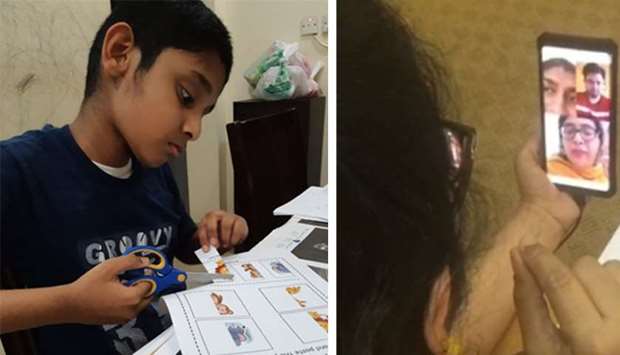Experts are sharing tips to ensure that autistic children get continuous care and their development is not hampered due to the Covid-19 pandemic and its impact on the education sector.
The issue was highlighted around Qatar, and across the globe, on Thursday on the occasion of World Autism Awareness Day.
Dr Rajeev Mathew Thomas, HOPE Qatar founder and managing director, said children with special needs deserve special care during the ongoing crisis and parents have to pay extra attention to them.
He stressed that steps should be taken to ensure that such children continue to receive therapeutic and educational support during the school closure period through virtual learning, videos and telephonic support.
“Parents also need to get trained on how these children are managed. They can consult specialised centres for support and training,” he explained, adding that HOPE Qatar has launched home learning and offers virtual education support.
Forty students are receiving support at home through the system, which has been completely developed by the staff. “The students are taught through video learning and worksheets, while parents are taught to help the children at their home,” he said.
Dr Thomas said video-conferencing ensures that the children do not miss their friends. “They need psychological support. They find it very difficult and challenging if they are isolated. They need extreme support and speech, occupational, and physical therapies should continue,” he said, urging parents to make use of online services and to avoid exposing the children to people from outside.
Regarding Covid-19, he said: “If parents suspect a child has been exposed to somebody who is infected, immediate medical attention should be sought. The child should go into isolation or quarantine if that is advised.”
Further, he said parents should help the child do what he or she may find difficult to do.
“There is a need to adopt proper precautionary measures. A child with special needs may not be able to do things like other kids. Parents should teach him/her to take precautionary measures such as covering the mouth, washing the hands and maintaining social distancing. Parents can show them how to do these things. And this could be done as a game or in a funny way. This can help the child learn things easily and they may imitate the parents through acts like washing the hands and covering the mouth,” he explained.
"I re-emphasise the need to continually stimulate the children with intellectual challenges while they wait out the restrictions period in their homes," he added.
On their part, the health authorities in Qatar have suggested a daily schedule for people with autism spectrum disorder.
An infographic, posted on the social media pages of the Ministry of Public Health, Hamad Medical Corporation and Primary Health Care Corporation, advised parents to use visual techniques and pictures to explain the schedule to their child.
The schedule includes activities such as family walk, one-to-one learning time (homework, skills training as agreed with professionals, etc), playtime, quiet time, active time (active sensory play), family activity time and reading, among others. The full schedule is available at https://www.moph.gov.qa/Style%20Library/MOPH/Videos/dailyscheduleASDen.pdf
Parents are advised to use the schedule as a sample, noting that they may have to adapt it as per the family routine and resources.
According to Dr Christina Lee Roberts, school psychologist at Renad Academy – a specialised school for children diagnosed with autism, under Qatar Foundation’s Pre-University Education – children with autism and their families require supportive strategies to cope with this uncertain time.
“Children with autism may face additional challenges, including difficulty understanding what is happening, inability to express their anxiety, and the need to have a constant routine, all of which may exacerbate their anxiety during this stressful period,” she explained.
“This is why parents are encouraged to use supportive strategies that they have adopted in the past to build and sustain their child’s emotional health and wellbeing.
“Keeping routines in place is vital, as children with autism thrive in a structured environment."
Another way to assist students in adapting and adjusting to the current situation is creativity, she says.
Dr Roberts also emphasised the importance of children with autism staying virtually connected with their teachers throughout school closures.
This year’s World Autism Awareness Day focuses on the theme, ‘The Transition to Adulthood’. United Nations Secretary-General António Guterres said the observance “takes place in the midst of a public health crisis unlike any other in our lifetime” and urged that special care be taken for autistic children.
“Persons with autism have the right to self-determination, independence and autonomy, as well as the right to education and employment on an equal basis with others. But the breakdown of vital support systems and networks as a result of Covid-19 exacerbates the obstacles that persons with autism face in exercising these rights. We must ensure that a prolonged disruption caused by the emergency does not result in rollbacks of the rights that persons with autism and their representative organisations have worked so hard to advance,” his message reads.
“The rights of persons with autism must be taken into account in the formulation of all responses to the Covid-19 virus. On World Autism Awareness Day, let us stand together, support each other and show solidarity with persons with autism,” it adds.
QF initiative helps over 300 children
Qatar Foundation (QF)’s Ability Friendly Football Program started delivering classes in 2019, and, since then, has worked with more than 300 children with specific needs across the country. Initially, the programme started as community classes, quickly followed by the introduction of a school programme, too, which saw the Ability Friendly Football Program team take the initiative out to the wider community and visit local Special Educational Needs schools and centres to provide children with more access to sports.


